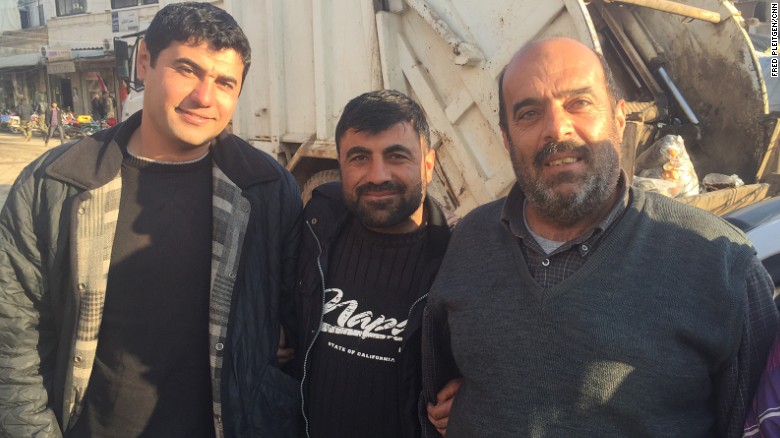'Thank you Russia!' Life after the siege for pro-regime Syrians
"Thank you Russia! Thank you Hezbollah! Thank you Iran!" shouts the man, as he passes us in the busy square.
Nearby, a photograph of Bashar al-Assad beams down from the front of the town hall, and banners in support of the Syrian President hang outside the main mosque.
This is Nubl, a mostly Shia, pro-government town in Syria, so close to the border with Turkey that on the way here our phones constantly switched to Turkish mobile networks.
Until two weeks ago Nubl and its neighbor al-Zahra were under siege; various rebel factions, including the al-Nusra Front and others linked to the Free Syrian Army, controlled the countryside nearby for more than three years.
Then the Syrian army -- backed by pro-Iranian militias and supported by controversial Russian air strikes -- broke through.
In Nubl, al-Assad-supporting local residents are still jubilant; "God, Syria, Bashar, and nothing else," a group of them chanted as we approached.
Many houses are decorated with posters of Hezbollah leader Hassan Nasrallah and Iran's Supreme Leader Ayatollah Ali Khamenei.
Outside the town hall, 14-year-old Zolfiqar Ali Jawish is selling cigarettes and candy. He says life under siege was a struggle.
"It was tough," he tells us. "Many people got sick and the kids were very scared. But after a while we became numb to the fear.
"Sometimes it took very long to get aid in here," he added. "It was awful because there was shelling all the time as well."
Humanitarian relief
Some supplies were able to get through, so the situation in Nubl was never as life-threatening as that seen in Madaya, where Syrian government forces were accused of leaving residents on the brink of starvation.
But those here say the army had to send aid in via airdrops, and earlier this week, theSyrian Red Crescent says it delivered humanitarian relief to the town and to Al Zahra.
Now, a few weeks on from the end of the siege, stores in Nubl are well stocked.
In the town's market, we saw several stalls offering an array of fruit and vegetables for sale; a barrow full of bright green apples was lined up next to trays loaded with tomatoes and potatoes.
The lifting of the sieges of al-Zahra and Nubl were key victories for the Syrian military not just because they boosted morale among pro Assad forces, but also because this area north of Aleppo is a decisive battleground in Syria's brutal five year long civil war.
The towns and villages here lie between the rebel-held parts of Aleppo and the border with Turkey; fully controlling this area would allow the Syrian army to choke off almost all supplies to rebels inside Aleppo, potentially dealing a crushing blow to the already weakened opposition.
One soldier who fought to end the siege of Nubl offered a stern warning to rebel fighters:
"Their families should encourage them to look for reconciliation or, I say, they will be killed," he tells us. "They have no other option."
'Cessation of hostilities'
But the opposition does not believe that reconciliation is truly on the government's mind; rebel factions say they are simply being slaughtered by Russian air power and a newly invigorated Syrian army.
The U.N. and other aid groups fear a protracted siege of rebel-held areas in Aleppo would lead to a humanitarian disaster for the many civilians also trapped there.
Already, tens of thousands of people have fled the city, heading for the Turkish border, leading to warnings of a surge in an already overwhelming refugee crisis.
Major world powers meeting in Munich, Germany, on Friday agreed on a plan to end the use of starvation and denial of medical aid as a weapon in this conflict. The U.N. has strongly criticized the Syrian government, various rebel factions, and ISIS for not allowing aid deliveries to surrounded areas.
They also agreed to what U.S. Secretary of State John Kerry called a "cessation of hostilities" in Syria.
Russia, however, says it plans to continue its airstrikes in Aleppo, as well as attacks against what it believes are terrorist targets across Syria.
The Syrian soldiers we spoke to said they were confident that, backed by Russian air power, their forces could make it all the way to the Turkish border -- dealing what could be a decisive blow to the opposition.
News Courtesy: www.cnn.com











